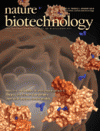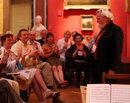 A fully equipped laboratory for studying pathogen-resistant transgenic plants will close its doors by the year’s end. The International Centre for Genetic Engineering and Biotechnology (ICGEB) Biosafety Outstation in Ca’Tron di Roncade, Treviso, Italy, was set up to study potential risks concerning genetically modified crops and plant pathogens of importance to the developing world. The outstation’s facilities, part of the ICGEB, were refurbished with financing from Treviso-based Cassamarca Foundation, supported by banking group Unicredit. But the bank’s financial woes have prevented the foundation from renewing the €4-million ($5.7 million), 5-year contract, says Mark Tepfer, leader of the outstation’s Plant Virology group. Continue reading GM crop biosafety lab folds
A fully equipped laboratory for studying pathogen-resistant transgenic plants will close its doors by the year’s end. The International Centre for Genetic Engineering and Biotechnology (ICGEB) Biosafety Outstation in Ca’Tron di Roncade, Treviso, Italy, was set up to study potential risks concerning genetically modified crops and plant pathogens of importance to the developing world. The outstation’s facilities, part of the ICGEB, were refurbished with financing from Treviso-based Cassamarca Foundation, supported by banking group Unicredit. But the bank’s financial woes have prevented the foundation from renewing the €4-million ($5.7 million), 5-year contract, says Mark Tepfer, leader of the outstation’s Plant Virology group. Continue reading GM crop biosafety lab folds
Category Archives: News
Parasitic larva ditches doomed host
 A recently discovered fly, Endaphis fugitiva, may be the first known parasitic insect that is able to escape a host that is under attack from predators. When researchers injured the fly’s host — called the banana aphid — or let brown lacewings attack the aphids, the fly larvae broke out of the aphid’s body (see video).
A recently discovered fly, Endaphis fugitiva, may be the first known parasitic insect that is able to escape a host that is under attack from predators. When researchers injured the fly’s host — called the banana aphid — or let brown lacewings attack the aphids, the fly larvae broke out of the aphid’s body (see video).
Read the rest of this news story at Nature.com [html] or here [pdf]
A Musical Tribute to Darwin and the Earth
 Charles Darwin may have had his biggest impact on biology, but he began his scientific career as a geologist. So it’s appropriate that earlier this year, retired geologist John Ramsay, who had long studied the famed biologist’s life, accepted a commission to compose a Darwin-themed string quartet.
Charles Darwin may have had his biggest impact on biology, but he began his scientific career as a geologist. So it’s appropriate that earlier this year, retired geologist John Ramsay, who had long studied the famed biologist’s life, accepted a commission to compose a Darwin-themed string quartet.
Performed by the Fitzwilliam String Quartet, Ramsay’s composition premiered in Cambridge, U.K., during the Darwin Festival on 7 July 2009. The Darwin Quartet gave its second performance late last month during the triennial Cambridge Music Festival. The two festivals jointly commissioned the piece, and Ramsay hopes the Fitzwilliam Quartet will record the composition next year.
Read the rest of this story at Science Magazine’s Origins blog: [html]
Avatar’s gaze illuminates social brain
 They may seem a little unsettling but the staring eyes of this female avatar were designed to grab your gaze and hold it, and also to obligingly follow where you look. By performing these actions with people placed inside a brain scanner, she has helped to demonstrate that guiding the gazes of others activates different brain areas than following.
They may seem a little unsettling but the staring eyes of this female avatar were designed to grab your gaze and hold it, and also to obligingly follow where you look. By performing these actions with people placed inside a brain scanner, she has helped to demonstrate that guiding the gazes of others activates different brain areas than following.